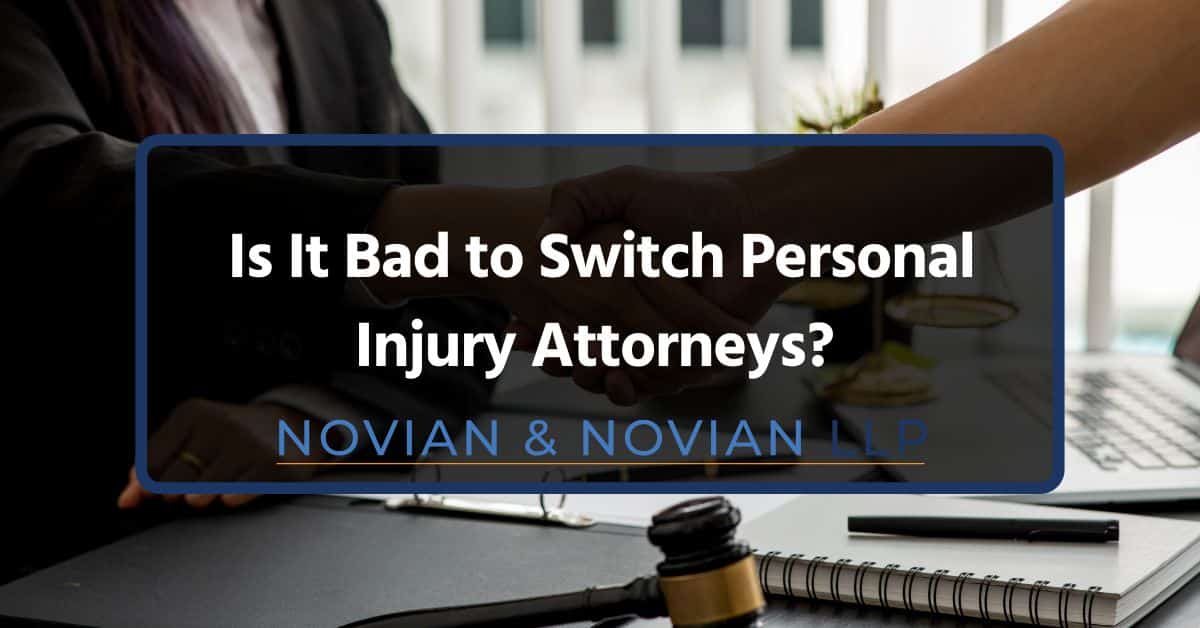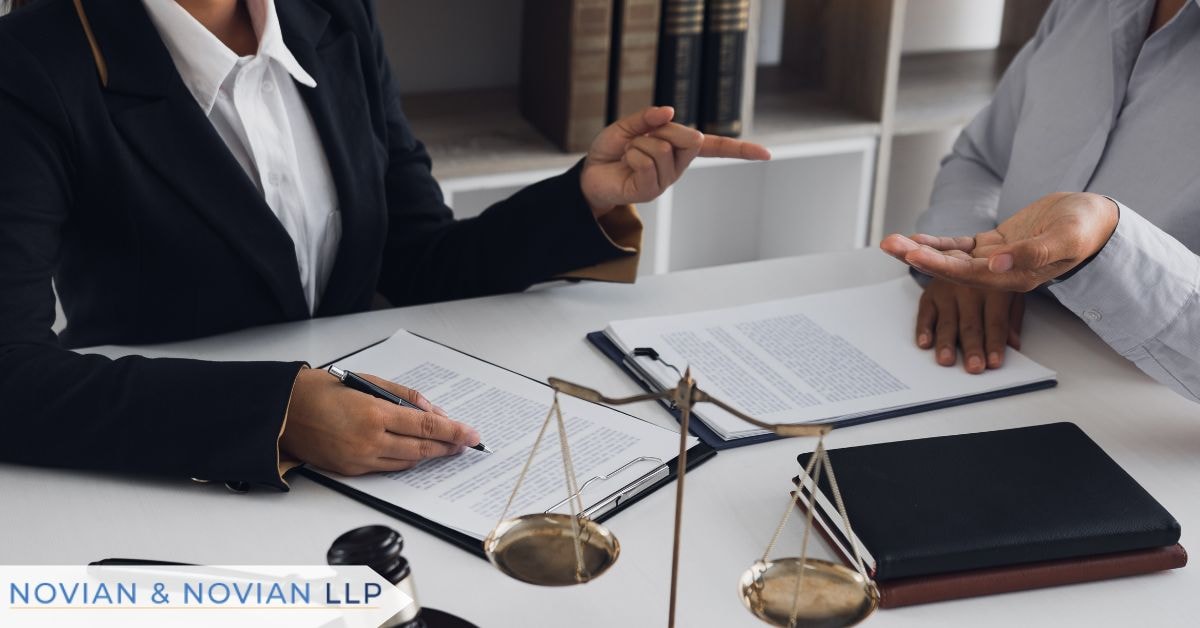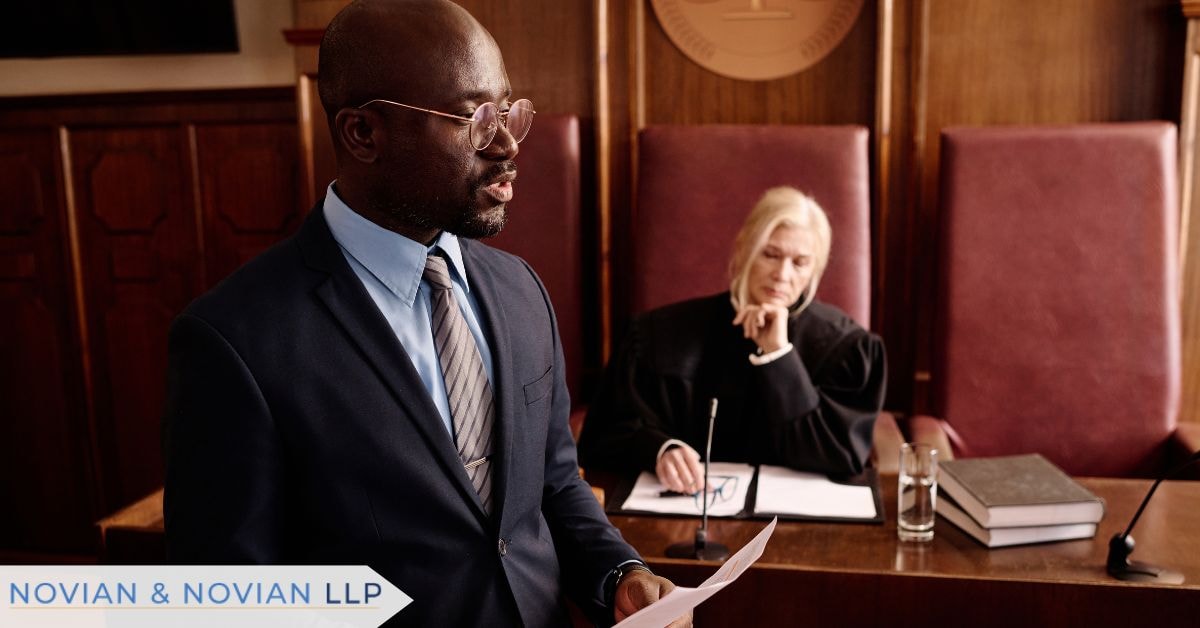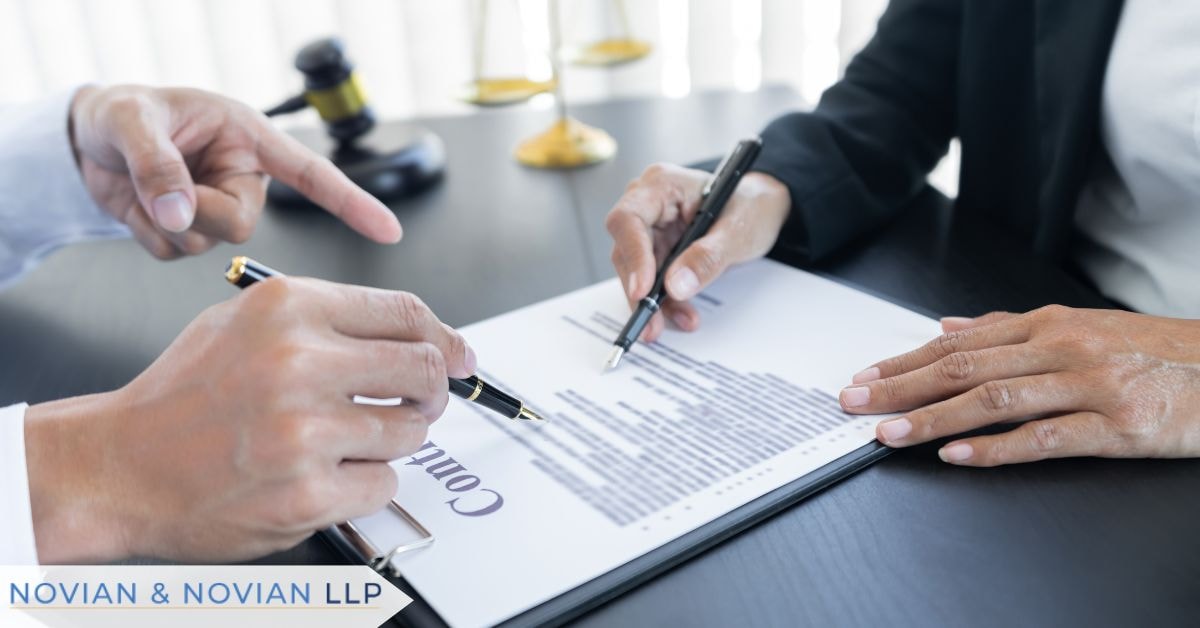When you’re in the middle of a personal injury case, the idea of switching attorneys can feel overwhelming. You’ve already invested time, shared personal details, and built a certain level of trust. So naturally, there’s hesitation.
But here’s the truth: you have every right to work with a lawyer who is truly advocating for your best interest. Therefore, it is not bad to switch personal injury lawyers.
At Novian & Novian, our catastrophic injury lawyers have over 35 years of experience helping clients secure the justice and compensation they deserve. If you want to switch personal injury attorneys, contact us today to discuss your case and how we can help.
This post will explore the topic of changing personal injury lawyers mid-case and common concerns people have. You will also learn how to switch personal injury attorneys smoothly.
Table Of Contents
Why People Consider Switching Personal Injury Attorneys
Changing lawyers during a personal injury case might seem like a drastic move, but for many clients, it becomes necessary when the attorney-client relationship starts to break down. One of the most common reasons people consider switching personal injury lawyers is poor communication. If your current attorney doesn’t return calls, leaves you in the dark about your case, or fails to keep you updated on important developments, it can lead to frustration and uncertainty. You deserve legal representation that is transparent, responsive, and proactive.
Disagreements over case strategy are another significant reason clients change attorneys. You may find yourself at odds with your current lawyer about whether to settle or proceed to court, how much your claim is worth, or how aggressively to pursue the insurance company. If you’re constantly feeling pressured or unheard, it can erode trust in your legal team.
Some clients lose faith in their lawyer due to a lack of professionalism or perceived inexperience. A personal injury attorney should specialize in handling complex claims and be able to guide you confidently through each step of the legal process. If your lawyer seems uncertain, makes frequent mistakes, or cannot explain things in more detail, it’s understandable to question whether you’re in the right hands, especially if you’re dealing with a high-stakes or catastrophic personal injury.
Another common concern is when the case appears to be stalled. If your personal injury case is experiencing time delays with little or no progress, and your current lawyer fails to offer clarity or a plan for moving forward, it may be time to seek new counsel. Your case deserves steady momentum and a legal team that is fully invested in achieving results.
Is It Legally Permissible to Switch Attorneys?
Yes, it is completely legal to change lawyers, even in the middle of a personal injury lawsuit. Many clients mistakenly believe they are stuck with their first attorney once the paperwork is signed, but this is not true. The law supports your right to choose legal representation that meets your needs at every stage of the process.
In most cases, switching lawyers does not disrupt your personal injury case. A new legal team can pick up where the previous lawyer left off, especially if your file has been maintained properly. This transition should not delay the court schedule or cause issues with the judge. Most experienced personal injury attorneys are familiar with how to handle a change of counsel efficiently.
Is It Bad to Switch Personal Injury Attorneys Mid-Case?
Generally, the attorney-client relationship should be built on trust, competence, and shared goals. If that dynamic breaks down, seeking new legal representation is not only legally permissible but might be in your best interest.
Pros of Switching Attorneys
One of the main advantages of choosing to switch personal injury lawyers is finding a more experienced or better-suited legal representative. Not all personal injury attorneys are equally skilled or specialized. If your current lawyer lacks the experience to handle a complex or catastrophic claim, bringing on a new attorney with a proven track record can greatly improve your chances of success.
Improved communication is another key benefit. Many clients make the decision to change lawyers simply because their current attorney does not return calls, offer case updates, or explain matters in enough detail. A strong attorney-client relationship relies on open communication and mutual trust. When you switch personal injury lawyers, you can find someone who aligns better with your expectations and provides the level of transparency and involvement you deserve.
A new legal team may also bring a more strategic approach to your case. Some lawyers are more willing to challenge the insurance company, take cases to court, or push for higher settlements. If your original attorney is pressuring you to settle early or appears to lack interest in maximizing your claim, you may benefit from new counsel who is ready to fight for your rights.
In many situations, a fresh perspective can lead to better outcomes. A new lawyer can review your file, reassess your claim, and identify missed opportunities or weak points in the current strategy. Especially in cases where there has been little progress, switching attorneys can breathe new life into the case and help you move forward more confidently.
At Novian & Novian, we understand how important it is to feel supported and properly represented. If you’re unsure about your current legal representation, our firm offers a free consultation to evaluate your case and discuss how we can help you move forward with clarity and strength.
Cons and Risks of Switching Attorneys
While there are clear benefits to changing lawyers, it’s important to understand the possible downsides. One potential drawback is the risk of case disruption or delays. A new attorney will need time to review the file, understand the case history, and get up to speed. This transition period could momentarily slow things down, especially if the case is already close to trial or in active settlement negotiations.
There may also be disputes over legal fees between your previous attorney and your new legal team. Most personal injury lawyers work on a contingency basis, meaning they get paid a percentage of your final settlement. When you switch lawyers, both the original attorney and the new lawyer may negotiate how to divide the fee. While this does not usually increase your cost as a client, it can create friction during the changeover.
Another concern is how the court might perceive a late-stage change. Judges and opposing counsel may view switching attorneys late in the process with some skepticism, especially if it seems to be a tactic to delay proceedings. That said, most courts understand that clients have a right to effective legal representation, and they will honor your decision as long as it doesn’t unnecessarily disrupt the claim or trial schedule.
Clients should also prepare for the possibility that changing counsel may not resolve all issues. If expectations are not clearly communicated during your initial consultation with the new attorney, the same problems, such as lack of communication or unmet deadlines, could reappear. That’s why it is important to research thoroughly, ask the right questions, and choose a lawyer or law firm that prioritizes your interests and has a solid reputation in handling personal injury cases.
Finally, switching attorneys might create emotional stress. You may feel pressured by your current lawyer to stay or be told that changing firms will negatively impact your case. But in most cases, that’s simply not true. You have the right to decide what’s best for your situation, and in personal injury law, the client’s well-being always comes first.
What Happens When You Switch Personal Injury Attorneys?
When you decide to switch personal injury attorneys mid-case, the process is usually more straightforward than most clients expect. Legally, you’re entitled to change lawyers at any stage of your personal injury case, but it’s important to understand how it affects legal fees, settlement negotiations, and the overall legal process.
Who Handles Unpaid Fees?
One of the most common questions clients ask is, “Who handles unpaid fees?” In most cases, you won’t be responsible for paying two separate sets of legal fees. Instead, the previous attorney and the new attorney will work out how to split the contingency fee once your case settles.
This arrangement typically falls under a lien agreement, where the original attorney is compensated for the work they performed before you made the switch. The financial split is often negotiated between the two law firms and should not impact the percentage you pay as the client.
Contingency fees are generally shared between the original attorney and your new legal team based on the amount of time and work each has invested in your case. This means you still only pay one contingency fee, usually a set percentage of the final settlement amount, which gets divided internally between the attorneys. This division is handled behind the scenes and does not usually require your involvement.
Common Concerns About Switching Personal Injury Attorneys
Clients often worry about how switching lawyers could impact ongoing settlement negotiations or litigation. If you’re in the middle of talks with the insurance company or preparing for trial, your new attorney will need some time to get up to speed. However, experienced personal injury lawyers know how to step into a case quickly and efficiently. While there may be a brief transition period, switching attorneys does not automatically jeopardize your case or delay the process significantly.
Another common concern is whether the judge or insurance company will view the change negatively. In most cases, they won’t. Judges understand that clients have the right to effective legal representation, and the insurance company is more focused on minimizing their payout than who represents you. As long as the switch doesn’t cause unreasonable delays or interfere with court deadlines, changing legal representation is seen as a normal part of the legal process.
When Is the Best Time to Switch Attorneys?
While you can change attorneys at almost any point in your personal injury case, the timing can influence how smooth and effective the transition is. Generally, the best time to switch personal injury lawyers is as early in the case as possible, ideally before litigation has begun.
Early changes give your new attorney ample time to develop a strategy, review all the details of your file, and take control of communication with the insurance company. The earlier you make the switch, the less risk there is of delay or confusion.
However, clients often don’t realize they need to change attorneys until the case is well underway. Switching during litigation is still possible, but it may come with a short adjustment period while your new counsel catches up.
If your original attorney has already filed court documents, started depositions, or begun negotiating a settlement, your new lawyer will need to review all existing work to avoid duplication and errors. Still, in most cases, the transition is worth it if you feel your current legal representation is inadequate.
Switching attorneys right before trial can be more complicated. Judges may be hesitant to approve a change in counsel too close to a trial date, especially if it risks delaying proceedings or creating courtroom inefficiencies. If the case has been scheduled and trial preparation is in full swing, it’s crucial to weigh the pros and cons carefully.
For example, our client, Mr Donald, switched attorneys earlier after realizing their first lawyer had never handled a catastrophic injury case. He came to us and we immediately restructured the case, introduced stronger medical evidence, and eventually negotiated a much higher settlement.
In contrast, another client waited until just weeks before the trial to make a change due to constant communication breakdowns. While we worked diligently to catch up, the court denied a request for a trial extension, which limited preparation time and affected the outcome.
In both cases, the decision to switch legal representation was valid, but the timing made a difference in how smoothly the case could move forward. If you’re considering a change, the best approach is to act quickly once you notice signs that your attorney-client relationship isn’t working.
How to Switch Attorneys in a Personal Injury Case
Here’s a step-by-step overview of how to make the switch smoothly and protect your case during the transition:
-
Review Your Current Retainer Agreement – Check for termination clauses, notice requirements, and any outstanding obligations before ending your relationship with your current attorney.
-
Consult a New Attorney First – Before firing your current lawyer, ensure your new personal injury attorney is ready and able to take over your case.
-
Sign a New Representation Agreement – Hire your new lawyer by signing a contingency fee agreement outlining their responsibilities and how fees will be handled.
-
Notify Your Current Attorney (Usually in Writing) – Keep the communication professional and concise. Most times, your new lawyer can take care of this step on your behalf.
-
Authorize the Transfer of Case Files – You’ll need to sign a release so your new attorney can obtain your case file and any relevant documents from the previous law firm.
-
Notify the Court (If Litigation Has Begun) – If your case has already been filed, your new legal team will submit a Substitution of Attorney form to formally update your representation in court.
-
Understand the Fee Arrangement Between Attorneys – In contingency cases, legal fees are typically split between the original attorney and the new one based on the work completed. You won’t pay legal fees twice.
-
Give Your New Attorney Time to Get Up to Speed – Allow a brief transition period for your new counsel to review your file, assess the strategy, and reach out to all relevant parties
Need a Skilled and Trustworthy Attorney on Your Side?
If you’re feeling uncertain about your current legal representation, remember that you are never stuck with a lawyer who doesn’t prioritize your needs, communicate clearly, or fight hard for your personal injury case. The attorney-client relationship should be built on mutual trust, respect, and open communication. And if that’s missing, it’s okay to make a change.
It is always important to weigh the risks and benefits carefully before switching attorneys. Timing, case complexity, and court deadlines can all play a role in how smooth the transition will be. But ultimately, no matter where you are in the legal process, your peace of mind and your right to fair compensation should come first.
Looking for one of the best personal injury attorneys in California? At Novian & Novian, we have over 35 years of experience successfully representing clients in complex personal injury cases. Let us help you move forward with confidence. Schedule your free consultation today!
FAQs About Switching Lawyers
Will I Owe My First Lawyer Money?
Personal injury cases are mostly handled on a contingency basis. Thus, you won’t owe out-of-pocket fees. Typically, your first and new lawyer will usually split the final fee based on the work done.
Can My New Lawyer Work With What’s Already Been Done?
Yes, a new attorney can review your file, build on the existing work, and take over communications with the insurance company or court with minimal disruption.
How Do I Know When a Lawyer Is Bad?
If your lawyer doesn’t return calls, lacks experience, pushes you to settle too soon, or makes you feel uninformed and unsupported, it may be time to reconsider the relationship.
When Should You Switch Lawyers?
The best time is early in your case. However, you can switch at any time, especially if you’ve lost trust or feel your case isn’t being handled properly.
Will Switching Delay My Personal Injury Case?
There may be a brief transition period, but in most cases, switching lawyers doesn’t cause significant delays if managed properly.
Can I Fire My Personal Injury Lawyer Before a Settlement?
Yes, you can end the relationship at any point before settlement or trial. Just review your agreement and consult your new lawyer to handle the process professionally.






